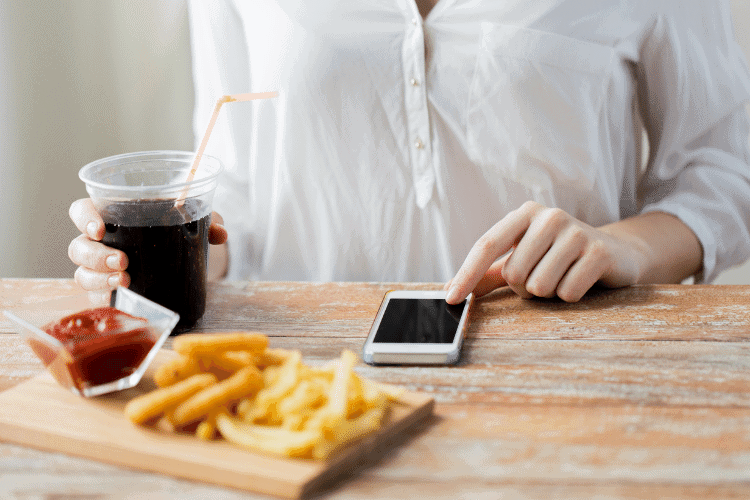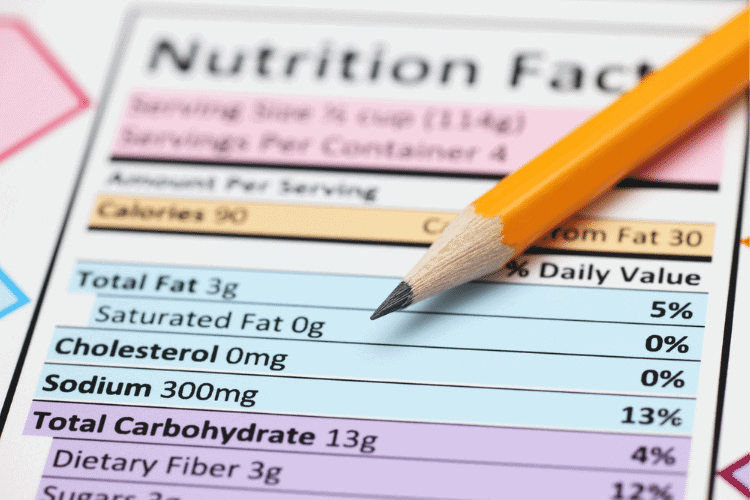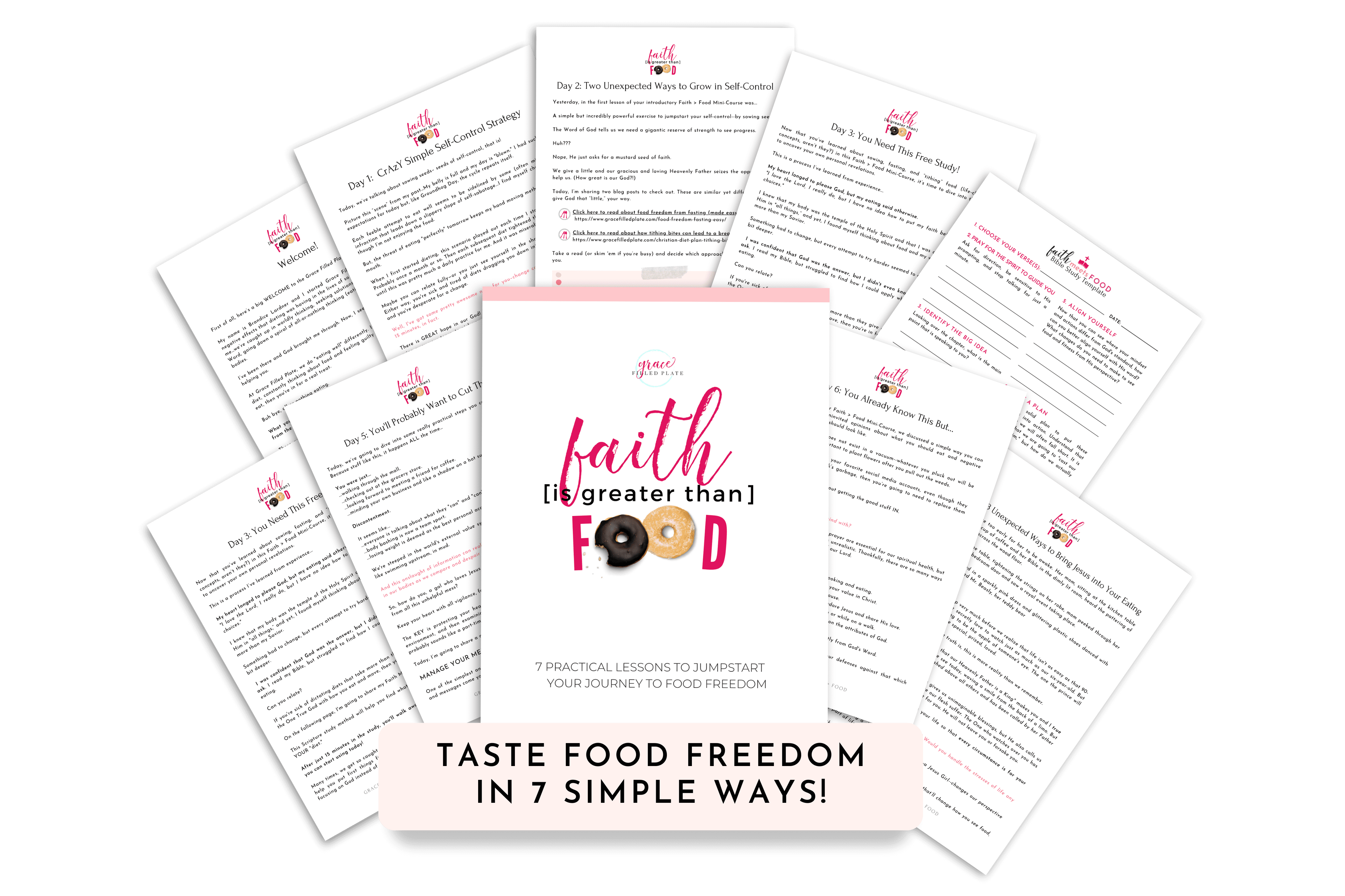If you find yourself wondering, “should I count calories?” this post will clear up the confusion. Learn the 4 reasons why and how to stop counting calories obsessively.
I may not be able to recite state capitals or remember the chemical elements on the periodic table, but I can tell you how many calories are in just about any food. I’m a recovering, chronic, obsessive calorie counter.
When others saw a teaspoon of butter, I saw 34 calories. While others browsed the menu at the pizza joint and saw toppings, I saw fat grams. I didn’t choose what to eat, the numbers did.
Calorie counting is one of those tools that tend to work exceptionally well for some while being a complete disaster for others.
Or, the practice may start out helpful and subtly turn into a hindrance. Sneaky, sneaky.
In this post, we will look at both sides of the coin and dive into the pros and cons of tallying up your own calorie intake. Then you can decide which route or balance works best for you.
Calorie Awareness Is On The Rise
When we think of losing weight, often the first thing that comes to mind is counting calories. As a culture, our calorie awareness is through the roof. The FDA now mandates that nutrition stats be plainly displayed on the menus of chain restaurants and even on vending machines.
Last year, the nutrition fact label that appears on every wrapper, can, and box was given a snazzy new makeover. This diet data sheet now highlights calorie counts and serving sizes for the eyes of hungry consumers.
The assumption is that knowledge is power. That by educating the individual on what they are eating, they’ll make better choices.
Yet, we have to wonder if this knowledge is actually helping us become a healthier, happier society? With Type 2 Diabetes and obesity on the rise, one can only hope that these stats will provide fuel for change.

How Will You Use The Tool In Your Hand?
Calorie counting is neither good nor bad. As I discussed in the post Is a Fitbit® Sabotaging Your Goals? 5 Pitfalls to Avoid, fancy watches and calorie calculations are only as helpful as the individual’s approach to using them.
While a hammer may be used to build a sturdy home, it may also be used to tear it down. When we harness the right tool for the job, the outcome speaks for itself. If we step outside of the beneficial use of that tool, we’re better off without it.
But with so many dieters and health gurus pumped up about calorie counting, there have to be some positives to tracking your every bite on MyFitnessPal, right?
Well, yes, there are some very helpful outcomes to calorie awareness. In fact, for some people, simply the knowledge gained from monitoring their calories for a few weeks is enough to jump-start their weight loss journey.
These are the ideal candidates.
For most, calorie counting can become a real burden.
For others, tracking becomes a form of restriction that backfires into the unhealthy behaviors they were trying to avoid in the first place.
Where do you fall on the spectrum? Let’s break down the positives and negatives so that you can make an educated decision on how you’d like to proceed in your own life.
4 Positives of Calorie Counting
Should I count calories? When you start tracking those meals, what happens? The benefits of adding up those bites are mostly about how we think about food. Because, how we think changes our behaviors.
1. Calorie counting increases awareness.
Outside of a lab, there is no way to know exactly how many units of energy (a.k.a. calories) are in your food. Recipes vary, weights are inaccurate and the chef gets lazy and adds an extra douse of salad dressing.
However, seeing the big picture of approximately how many calories are contained in commonly consumed foods is a real eye-opener. This enlightenment may prompt consumers to choose lighter options or to keep an eye on their portion sizes.
2. Calorie counting allows you to objectively count the “cost.”
For some, counting calories offers freedom. Yeah, the opposite of what we will discuss in a few minutes.
I’ve worked with several clients who came from diets that villainized certain foods. Leveraging their new found “freedom,” they felt comfortable swapping out some “healthy” foods for those they perceived less so. Such as choosing a small scoop of ice cream instead of an ounce of nuts. With these two items being equal in calories, clients were able to let go of the angst of adding in “unhealthy” food by seeing it for its numbers.
3. Calorie counting can assist in weight-loss math.
Weight loss really is about calories in versus calories out. While there are many factors that affect how we each metabolize food (hormone status, muscle mass, gut bacteria, emotional state and more), the law of thermodynamics still prevails.
If you track your food consistently, you will see the overall number that leads to your weight loss, gain, or maintenance. Then, if you want to change the outcome, you can adjust your intake accordingly.
Note that, in some cases, chronic undereating can impair your ability to lose weight.
4. Calorie counting can help you course correct.
Over the years I have used calorie counting to help numerous clients break through a weight loss plateau. These were individuals who were happily following their nutrition habits to the best of their ability but no longer seeing results.
In this case, the client would tediously track calories for a few days to a week. We’re talking measuring spoons and food scales tedious.
More often than not, we would find a “hidden” source of extra caloric intake. With this knowledge, we could easily correct our course with a simple habit and then set tracking aside.
4 Pitfalls Of Calorie Counting
1. Calorie counting can give you a false sense of security.
It is easy to treat caloric expenditure and intake estimates as truth, but unfortunately, they are anything but.
The calorie content on a menu doesn’t account for the variations of human touch. Imagine the busy chef who adds a second dollop of butter to your vegetables or the barista who smiles as he swirls on an extra mountain of whipped cream to your drink (tip me, please!). And, you can be sure that it’s not just them– we do it too.
Have you ever measured a tablespoon of nut butter or a half cup of ice cream and then went in for an extra spoonful before putting the lid on? Yeah, me too.
The number we calculate at the end of the day is likely a couple of hundred calories off. No joke!
2. Focusing on calorie counts can disconnect you from your body.
When our calorie count becomes the be-all, end-all, we’re prompted to override our bodies’ true needs… You may eat even though you’re not really hungry just because you have an extra 100 calories in the “bank.”
On the other hand, let’s say that you had a very active day and you’re ravenous. What do you do if you have already used up your allotment for the day? Using electronics to monitor our energy needs can cause us to miss, and then ignore, important body cues.
You’re tired, cranky, and craving sweets like a crazy woman. You think you’ve got no self-control but you’re just straight-up hungry.

3. Choosing foods based on calories rather than nourishment is an unhealthy practice.
If calorie counting prompts us to choose heavily processed, fake foods over nutritious real food, then we’re doing ourselves a disservice.
While calories do count, our bodies don’t live on calories alone– they thrive on nutrients. If low-calorie trumps high-quality in tracking, then there’s a balance to be found.
4. Counting calories can become just another diet.
Let’s all say it together: “diets stink!” Crazy rules about what you can and can’t eat are exhausting and unnecessary for health and weight loss.
External guides are only helpful when they teach us to self-navigate.
Adhering to the “rules” of calories can become a form of restriction that leads to rebound eating. If your daily calorie tally becomes “law,” then you may be headed into some disordered eating behaviors and you need some diet help.
Should I Count Calories?
So now that you’ve had a chance to look over some of the pros and cons of counting calories, what do you do? For some the answer to “should I count calories?” will be crystal clear, but others may feel unsure of where to go next. That’s ok, I am here to help!
What To Do
Download your Calorie Counting Positives & Pitfalls Worksheet below and complete those essential exercises.
Take a look at the lists above. On a scale of 1-10, rate how positive the positives are in your life and how negative the pitfalls are.
Add any additional pros or cons to your list and rate them also. Add up your numbers. Is the scale tipped drastically to one side or the other? If there is a great divide, I think you have your answer.
If your numbers are pretty close, please take a moment to look at the positive points of calorie counting. Is there any way that you could achieve the same results with a different practice?
Or maybe you feel hungry more often– reduce your portion sizes to stay within your goal, skip Starbucks most days of the week, or eat more slowly to savor every bite.
These are all things you can do without an electronic nanny. Get honest and you will see how you can get results and keep your sanity!
Calorie counting is a tool but, thankfully, it’s not the only one.
Be sure to download your Calorie Counting Positives & Pitfalls Worksheet below and complete those essential exercises.
How to Stop Tracking Calories, In Conclusion
Calorie counting isn’t inherently good or bad. As individuals, it is our responsibility to honestly assess our own practices and outcomes and decide what steps to take next. This may or may not include tallying our food intake.
Remember that you change. What worked for you last year is not necessarily going to work for you now. And what fits like a glove today may feel like a straight jacket next summer. Don’t judge.
It is ok to try something and decide that it is not a good fit for you. These decisions, while important, are not immovable, so you can relax and take your best guess.
Brandice Lardner is a Certified Personal Trainer, Nutrition Coach, Amazon #1 Best Selling Author, Homeschool Mom, and Jesus Girl whose mission in life is to help women ditch the diet mentality and find peace with food and their bodies so that they are better equipped to do the great things God has called them to do.





Leave a Reply